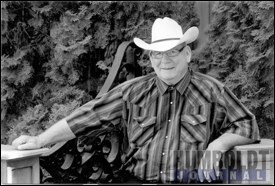Mel Stroeder held his first auction on October 2, 1976. It started at 1 p.m. in his hometown of Marysburg and, if you had cash to spend, you could have gone home with anything from a 1966 Ford truck to a washing machine. In the top right corner of the advertisement for the auction was a picture of a man in a cowboy hat. "Mel Stroeder - Auctioneer", it read below the picture.
After 38 years and hundreds of auctions, the man in the cowboy hat has come a long way from that humble sale in Marysburg. In fact, Mel became one of his profession's most decorated members when he was inducted into the Saskatchewan Auctioneers Association Hall of Fame on Feb. 7.
Mel's lifetime in auctioneering began when he was young and listening to his uncle Lawrence, himself a member of the Auctioneer's Hall of Fame. Young Mel had caught the auctioneering bug and in 1976, after saving some money from the corner store that he ran with his wife Josie, Mel enrolled at the Western Canada School of Auctioneering in Lacombe, Alta. It was in Lacombe that Mel learned what he calls his "lingo", the distinctive rapid-fire style of speaking that defines auctioneers.
"The first thing you have to learn is your lingo, your bid call," Mel says from the kitchen table of his house in Humboldt. He breaks out into one of those drills he was put through in Lacombe, counting up in increments of two-and-a-half. If you closed your eyes you could imagine him, cowboy hat and all, calling out those numbers at a sale.
"Two-and-a-half, five, seven-and-a-half, ten, twelve-and-a-half."
The words spill out in a steady rumble, fast and clear. Speed is good, but the people have to know what you're saying.
"Once you got good at that they made you go backwards, maybe from 95 all the way to zero," he says.
It's early in the morning, and Mel and Josie are looking back on nearly four decades in the business - he as the auctioneer, she as the invaluable cashier and registrar, making note of everything bought and sold at every auction, which could be almost anything: cattle, pigs, combines, tractors, and of course the everyday items that came with estate sales.
Those were sometimes sensitive, but, under Mel and Josie's watch, always done as quickly and efficiently as possible.
"If Granny died, we'd go into that house on Friday or Saturday and pack everything up," Josie says. "On Sunday morning we'd set up a bunch of tables outside, haul everything out and by four o'clock it was all gone and the estate could be settled."
A few days later Mel and Josie would inevitably invite the family members over for a social gathering and to distribute the cheques: always in person, never through the mail.
It's all part of an old school philosophy that guided Mel and Josie until 2006, when Mel had a heart attack and they both stepped away from the auctioneering business. These days Mel only breaks out his old tricks for charity auctions with a local church and museum.
Auctioneering never provided enough to live off - Mel drove cement trucks, there was the corner store and they had a janitorial business when they lived in Yellowknife for 10 years - but it would pick up in April when farmers began to prepare for seeding. It was then that Mel would sometimes work three or four auctions a week. In the crowd there were often familiar faces, people with peculiar quirks or habits that Mel began to pick up on.
"There was an old guy from around here who'd buy one beef cattle a year," Mel remembers. "He'd sit in the front row and when we started selling he'd take his hat off and put it on his knee. As long as he left it there you kept taking his bids. When he put it back on that was his way of saying he was done."
That wasn't all. Even though there was usually a bid catcher wandering through the crowd to help Mel spot bidders, there were lots of subtle signs that only an experienced auctioneer would pick up.
"When a buyer goes like this" - here Mel leans forward and rubs his index finger and thumb together - "you have to know that means he'll pay another dime, nothing more."
Those are the details that separate the good from the great, the run-of-the-mill from the Hall of Famers. Mel's talent got him noticed and helped establish his weekly auctions at the Humboldt cattle market (now the site of the Vintage Club) as a must-see.
"We had a fan club of people that would follow us around to every sale, and that's how we built up a crowd," Josie says.
At the induction ceremony in Regina, Mel's biggest fan club, his family, was there: Josie, his daughter Susan and son-in-law Jerome, son Tom, daughter-in-law Francis and grandsons Jamie and Jordin. Also there was his professional family, the auctioneers who, like him, have sold everything under the sun. It was a rare opportunity for Mel to rub shoulders with his contemporaries. There was also a small fundraising auction, a chance for the assembled masses to show off their talents.
"It was fun sitting there and listening to 25 other auctioneers and all the different lingo they had," Mel says.
He starts to imitate those other auctioneers; some spoke fast, some loud, some in between. He hems and haws and his voice thumps like the blades of a helicopter. It only lasts for a few seconds, and then it's gone.
Mel Stroeder may be retired, but he's still got it.




